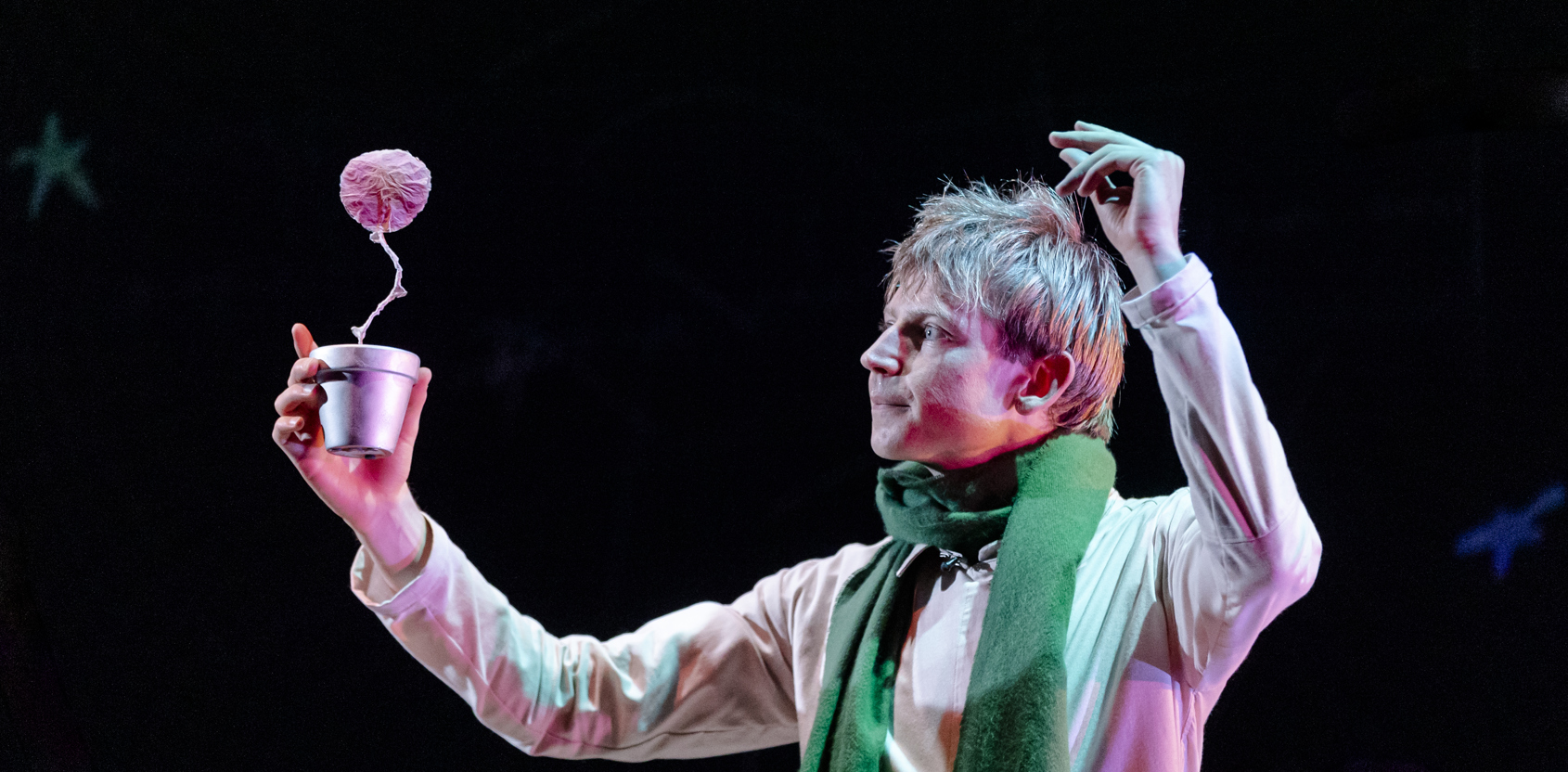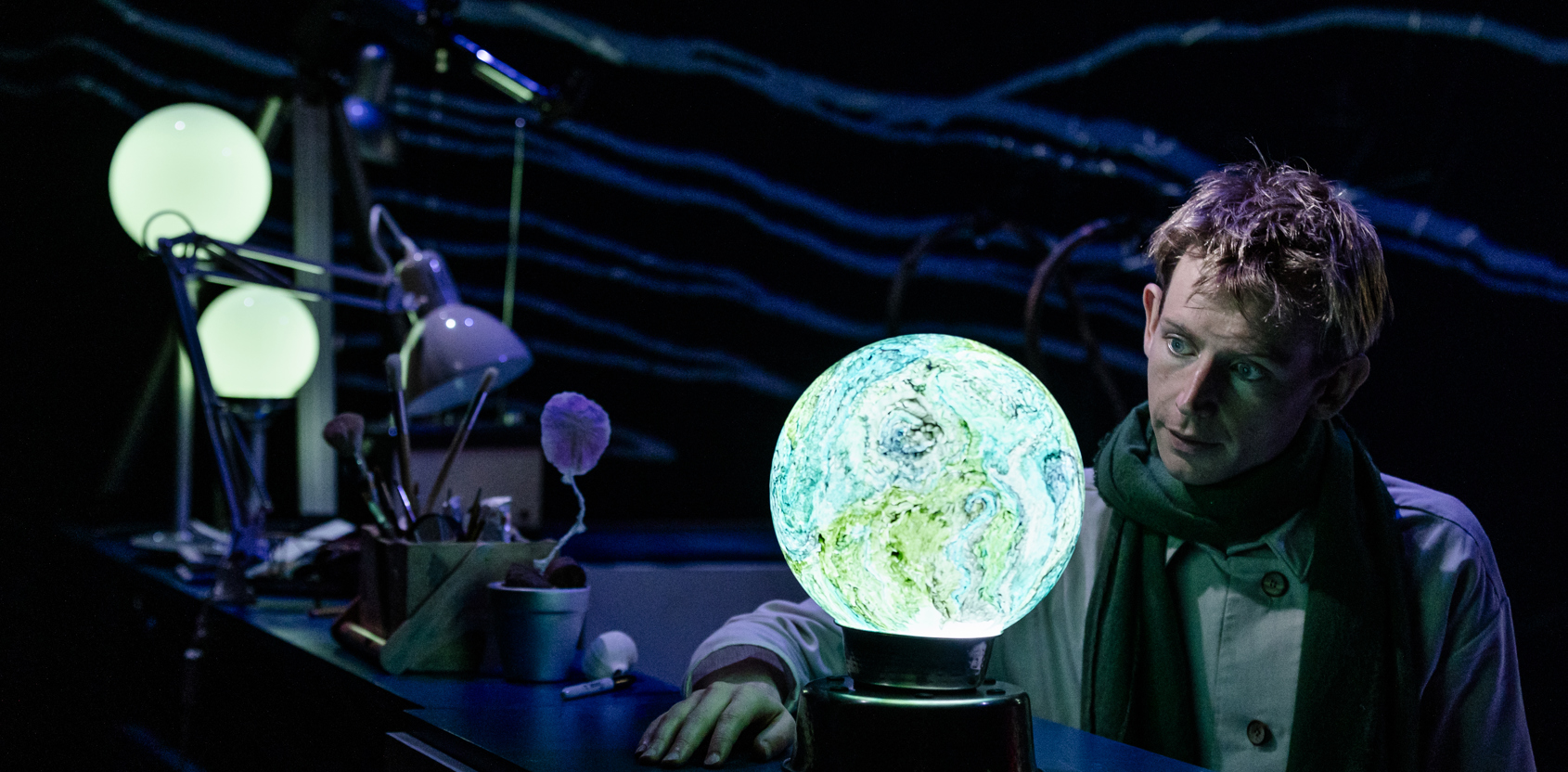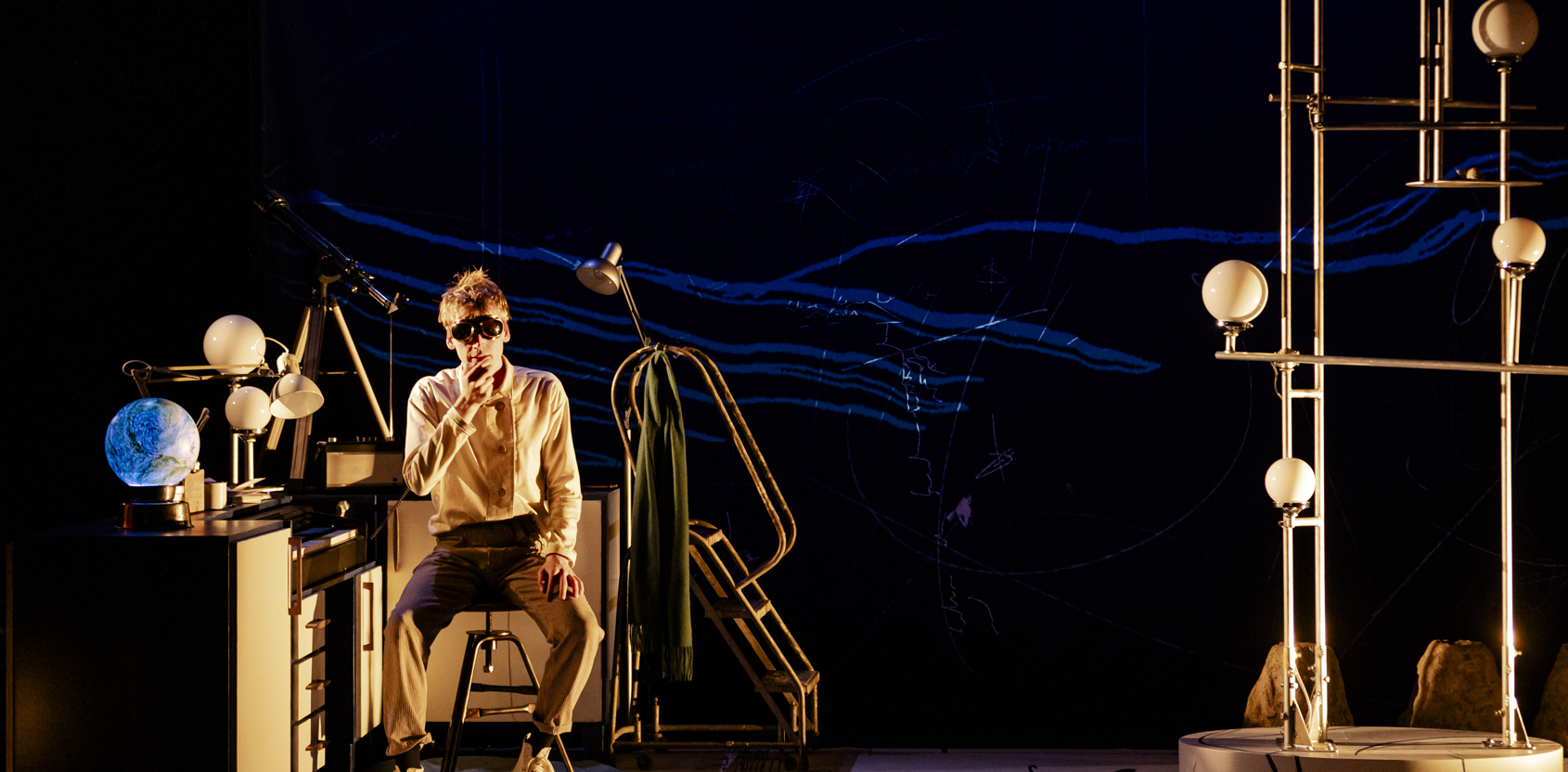The Little Prince Programme
Programme Contents:
1. Creative Team and Credits
2. A note from The Egg
3. A Note from the Director
4. For teachers and Caregivers
5. Fun Facts
6. A note from the Writer and Performer
7. An Interview with Toby Thompson
8. Trailer and Film

Creative & Production Team
Writer & Performer: Toby Thompson
Director: Nik Partridge
Production Designer: Anisha Fields
Lighting Designer: George Seal
Video Designer & AV Engineer: Nick Laws
Composer & Sound Designer: Alex Heane
Composer & Sound Designer: Bethany Stenning
Composer & Sound Designer: Joseff Harris
Production Manager: Becky Vowles
Stage Manager: Chaz Webb
The Little Prince is Produced by The Egg Theatre Royal Bath
A note from The Egg
The Egg at Theatre Royal Bath is dedicated to producing and presenting work with exacting artistic standards for children and young people. A hub for creativity, learning and culture, the company presents a year-round programme of productions and engagement for people aged 0+.
The Egg advocates for beauty, joy and profound curiosity in its work. Toby's adaptation of The Little Prince embodies these values. With such a light touch he is able to offer audiences surprising insights into our very existence, transcending the noise of everyday life and getting right to the heart of what it means to be human. We're very excited to be sharing this meditative gem of a show with audiences of young people and their adults and hope it piques their interest in what live performance can offer.

A Note from the Director
Adapting a story as iconic and well-loved as The Little Prince is a daunting challenge and, like the novella itself, we have taken a gentle, meandering route to get to where we find ourselves today.
The primary challenge for us has been finding the right theatrical form for the story, one that justifies it as a stand alone piece of theatre, not just a retelling of a book. Merging Toby’s words, voice and artistry with the original has been key to distilling its essence into something we hope is somewhat more palatable than a boa constrictor digesting an elephant!
The Little Prince is both an epic tale, spanning Saharan sands to star-scattered skies, and a very simple ode to the power of the imagination. The Pilot’s recounting of his meeting with the Little Prince is an act of creative love that shows us how powerful, cathartic and intimately expansive stories can be.
We have been carried on this journey by an (inter)stellar flock of extraordinary creative birds, who are named in this programme. We hope this story transports you, as it did us, and offers the space for your imagination to soar.
Nik Partridge

For Teachers and Caregivers
We have written some framing questions. If each child attended the play thinking about just one of these questions, it might offer a portal into the content and themes of the story.. We also have these questions available on stickers, which we hope to send to schools in advance of their visit:
⭐ Can you feel happy and sad at the same time?
⭐ What’s the greatest adventure you’ve had?
⭐ What wonderful thing doesn’t last forever?
⭐ How does planet earth keep you alive?
⭐What does the heart see that the eyes cannot?
⭐ Is it easy or hard to make a friend?
⭐ How does a sunset make you feel?
⭐ What makes you feel better when you’re feeling sad?
⭐ What’s the difference between a child and a grown up?
⭐ What does tamed mean?
⭐ Was it a hat? No? Then what?

Fun Facts
⭐ The Little Prince, by Antoine de Saint-Exupéry, is the second most published book worldwide after the bible, translated into 250+ languages.
⭐ There are more stars in the sky than grains of sand on earth.
⭐ When Toby was in Marseille earlier this year to run a workshop on his adaptation process, he went into a vintage clothes shop. They talked. It turned out that the owner had met the fisherman who found a bracelet engraved with the name of Saint-Exupéry's wife, Consuelo, in the sea near Marseille. Small world.
⭐ The Little Prince is often considered a children's book, but its themes and messages are universal and resonate with readers of all ages.
⭐ Like the main character, Antoine de Saint-Exupéry was also a pilot. And he did crash in the desert. And he did nearly die there.
⭐ Antoine de Saint- Exupéry based the illustrations on what he could find. Pulling inspiration from his own life, he modelled many of the characters from real figures. For example a friend’s poodle became the sheep.
⭐ Toby’s first trip to the Edinburgh Fringe was at the age of 14 playing Dunks, a drug dealer (!) in a hip hop retelling of Macbeth called Max and Beth at The Underbelly, also produced by The Egg!

A note from the Writer and Performer
Dear Audience Member,
I confess to struggling somewhat, much as the pilot struggles at the start of this show, to know quite where to begin. Perhaps I’ll begin where I am (as if I had a choice!) and see where that leads. It will be an adventure. Everything’s an adventure when you come right down to it. Nothing stays still in time and space, but I digress. Correction, therefore I digress.
Right now it is early in the morning of the 23rd of August 2024 and I am sitting looking out through the big bay windows of a cafe on George Street in Bath. Among the things my eyes can see are puddles and people and pigeons. Cars and bikes and busses come and go, come and go, here and then gone like moments.
But what of The Little Prince and his adventure? I’m not going tell you what it’s all about. I may as well say that up front. I’m not going to tell you the meaning of the story, mostly because I haven’t got a clue. No! That’s not true, I have lots of clues, countless clues, clues coming out of my ears, so to speak. But the story of the Little Prince, crucially, is not a murder mystery. No crime has been committed. These clues I am speaking of are not the sorts of clues that lead to a closing down of all possibilities but one; quite the complete reverse!
Alright alright, I’m aware that so far in these programme notes the single contextualising insight the writer has offered is that ‘The Little Prince is not a murder mystery’, but bear with me, I think we may be onto something. For if The Little Prince is not a murder mystery, then what in fact is it? What genre are we in here? Children’s fiction? Pah. That’s just the name of a shelf in a shop. Better would perhaps be to call it a love mystery— on second thoughts that sounds a trifle salacious. A friendship mystery? Let’s go with that. The Little Prince is a friendship mystery.
And the thing about friendships—whilst undoubtedly mysterious—is that they are in no way problems to be solved; they are flowerbeds to tend; they are sunsets to behold; they are silver river milky way liquids to dissolve in. They come and they go like the bikes and the busses, and when they go, what are you left with? What The Pilot in the story is left with is everything you’ll witness in the course of this show. The loneliness he feels is permeated with the essence of the friend he has lost, such that the loss has itself become something precious—something found.
There’s a comment the Little Prince makes in the original; one of the many perfect lines by now imprinted on my heart which I am sure I’ll now be quoting for the rest of my life. The Little Prince observes: ‘it’s good to have had a friend, even when you’re going to die.’
I said I wasn’t going to tell you what the show’s about, and I’m not. I’m not. All I’m saying is that if you were to take that quote and look through it like a picture frame that hasn’t got a picture in or any kind of backboard; and if you were to hold such an empty picture frame up to a night sky all filled up with stars; then whatever you saw through it mightn’t be a bad blurb.
Thanks so much for being here and I hope you enjoy the show.
Toby Thompson

An interview with Toby Thompson
Your adaptation of The Little Prince mixes the silly with the serious. How do you make sure it connects with both children and adults?
The adaptation we’ve made is—how should I say this—not especially minimalistic! It has its quiet and reflective moments, to be sure; starlit pauses during which to take a breath and have your pulse quickened by the vastness of the universe. But our offering is essentially of the crammed-full-to-bursting-with-sensory-ingredients variety. The language is unabashedly rich; I have learned over the years that children are capable of revelling in more complexity than might be expected, provided the vibe is right. We have striven to concoct one such correct vibe!
What does The Little Prince mean to you, and how has that influenced your adaptation?
Speaking as an only child—and moreover as one who spent much of his toddlerhood solitarily roaming the sprawling fields of a far flung farm—the themes of loneliness and love, and the lilting manner in which they dance together in The Little Prince, are to me endlessly pertinent and poignant.
I also resonate strongly with the threads of the tale that have to do with seeing life in grown up vs childlike ways. I definitely have a Little Prince inside of me (probably we all do); innocent and open and ready to play at the drop of a hat. But I also have within me a Pilot fully grown: guarded and logical. Both of these occupants of my psyche have been invaluable friends and editors to me as I’ve gone about creating this show!
What is your favourite quote from The Little Prince?
“The stars are beautiful because of a flower that cannot be seen.”
If you were to sum up your adaptation in three words, what would they be?
Playful. Cosmic. Heartfelt.
You’ve performed in many places around the world. How do you adjust your storytelling and poetry for different audiences, especially children?
Good question. I want to say I just sort of feel it! But I realise that’s not much of an answer. I suppose what I mean is that the changes I make are as much instinctive as conscious. Whenever I perform my work, I want it to be a conversation. Everyone’s eyes and ears may be directed towards the stage, but the quality of the listening and of the watching, though silent, is itself profoundly communicative. So I listen to the listening of the audience and make adjustments as I go. It’s just about keeping the connection alive.
In today’s climate crisis, stories about connection and responsibility feel more urgent than ever. How does The Little Prince inspire conversations about our role in protecting the environment and each other?
There’s a line in our retelling, spoken by the little prince in reference to planet earth: “… and there’s no one else to talk to for millions of light years in every direction. It’s like a well in the desert, it keeps you alive, it’s like a well in a desert made of stars instead of sand. I feel very lucky to have found it.” There’s something about the cosmic scale of this story which invites a sense of awe. And I believe awe and wonder are indispensable to us in this time of crisis, that it’s a prerequisite for hope that our hearts be open to the dizzying majesty of it all.
What message do you want young audience members to take away from your show?
The universe is vast and mysterious. Life on earth is rare and miraculous. Sunsets are wonderful when you’re feeling sad. And there’s nothing like making a friend.



